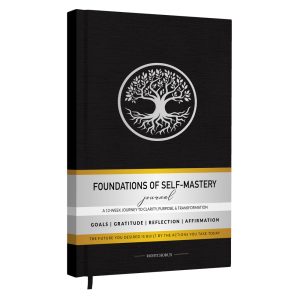Journaling is one of the best tools for nurturing self-awareness and cultivating daily mindfulness.
Choosing the best journals for writing can significantly deepen your experience, transforming sporadic entries into a meaningful self-discovery practice.
Whether you’re a beginner reflecting for the first time or a seasoned journaler seeking clarity, the right journal acts as a compass—helping you navigate your inner world with purpose.
In this guide, we’ll explore what makes a journal ideal for self-growth and mindful writing. We’ll also highlight transformative tools like the Foundations of Self-Discovery Mastery Journal designed to guide you toward emotional well-being, reflection, and lasting change.
Foundations of Self Discovery & Mastery Journal: A 13-Week Personal Development Journal System
$29.95
The Foundations of Self Discovery…
Table of Contents
Choosing the Best Journals for Writing Based on Your Goals
Not all journals are created equal. The best journals for writing are those that align with your unique goals—whether you’re journaling for clarity, emotional healing, or intentional living.
Here’s how to choose the right framework for your intentions.
Journaling for Self-Discovery
Journaling as a self-reflective practice allows us to peel back layers of thought, emotion, and memory to reveal who we truly are.
Exploring your beliefs, desires, and habitual patterns in writing fosters deep personal insight.
Structured reflection journals make these moments more accessible and transformational by encouraging consistent engagement.
The Foundations of Self-Discovery Mastery Journal is ideal for this purpose. It’s designed with:
- Daily prompts to nudge deeper inner reflection
- A six-part framework to structure your thoughts and feelings
- Free-writing space for spontaneous self-expression
- Weekly and monthly checkpoints to track emotional patterns
You don’t have to navigate your thoughts blindly—this guided format empowers beginners and seasoned writers alike to move past surface-level insights and embrace deeper personal truth.
Journaling for Mindfulness and Clarity
When your mind feels scattered or overwhelmed, mindful journaling can bring a quiet clarity.
Focused writing helps identify emotions, externalize stress, and pause the mental swirl so you can ground yourself in the present moment.
Use a journal that offers flexibility and structure:
- Daily gratitude logs to foster a positive mindset
- Mood trackers to identify emotional fluctuations
- Morning intentions to set the tone for your day
- Evening reflections to soothe and release mental clutter
Whether you’re setting daily intentions or reflecting on moments of joy, mindfulness-focused journaling invites stillness into your routine—a powerful antidote to hectic modern life.
Foundations of Self Discovery & Mastery Journal: A 13-Week Personal Development Journal System
$29.95
The Foundations of Self Discovery…
How the Best Journals for Writing Support Personal Growth

The best journals for writing are more than a blank canvas—they’re growth tools that invite transformative self-understanding.
Your personal growth journey will flourish with a journaling format suited to how you think, process emotions, and stay motivated.
Guided vs. Blank Journals
One common crossroads is deciding between guided and blank journals. Guided journals are treasure maps for beginner and intermediate writers—offering prompts, structure, and momentum.
In contrast, blank journals cater to those who prefer unstructured creativity and emotional flow.
- Removes friction around “what to write”
- Encourages deeper, more specific self-inquiry
- Supports habit formation through structure
- Helps uncover recurring mental and emotional themes
Blank page journaling:
- Offers full creative and emotional freedom
- Ideal for long-form writers, artists, and doodlers
- Best when you already have journaling discipline
- Encourages versatility in writing, sketching, or scripting
The Foundations of Self-Discovery Mastery Journal strikes a beautiful balance with both prompted guidance and lined space—perfect for users who want freedom within structure.
Daily Rituals to Enhance Growth
Making journaling a consistent habit turns your journal into a daily compass. Used with intention, journaling can:
- Rewire thought patterns that fuel self-doubt
- Reinforce emotional regulation and self-compassion
- Improve focus through goal-based planning
- Serve as a tracking method for mental wellness progress
Create rituals that feel nurturing:
- Write three things you’re grateful for over morning coffee
- Reflect on your triumphs and lessons at night
- Journal after therapy or coaching sessions to deepen integration
- Use the same pen or space to signal consistency
Structured journals like the Foundations of Self-Discovery Mastery Journal give your practice rhythm with features like daily prompts, evening check-ins, and goal progress trackers.
Foundations of Self Discovery & Mastery Journal: A 13-Week Personal Development Journal System
$29.95
The Foundations of Self Discovery…
Design and Features to Look for in the Best Journals for Writing
When searching for the best journals for writing, don’t overlook how physical design impacts engagement.
A well-crafted journal will invite you back each day—making your self-discovery practice enjoyable, tactile, and convenient.
Binding, Size, and Paper Quality
The journal’s physical form affects your comfort and consistency. Look for durability, size-to-purpose fit, and paper quality that elevates handwriting into a sensory experience.
- Hardcover journals offer structure, longevity, and a professional feel
- Softcover journals feel flexible, portable, and lightweight
- A5 sizes (5.8 x 8.3 in) are ideal for portability
- Smooth, thick paper prevents ink bleed and enhances writing freedom
Choose materials that suit your environment: a commuter may prefer softcover, while a desk dweller might enjoy a hardcover edition.
Page Layout and Prompts
Ease of use is essential. The best journals for writing often have thoughtfully designed pages that remove friction and fuel flow.
Structured elements to seek:
- Prompted sections like gratitude, goal setting, and mood logs
- Clear formatting to reduce decision fatigue
- Cross-referencing options to organize longer reflections
- Date-free pages to reduce pressure and boost flexibility
The Foundations of Self-Discovery Mastery Journal excels here. With its six-part daily framework, cross-referenced notes pages, and weekly reflections, you’re never left wondering what to write about or how to track your growth.
Foundations of Self Discovery & Mastery Journal: A 13-Week Personal Development Journal System
$29.95
The Foundations of Self Discovery…
Using the Best Journals for Writing as a Wellness Tool

Journals serve as silent wellness mentors, helping us unpack emotions, lower stress, and gain clarity.
The best journals for writing hold space not just for thoughts—but for healing, wholeness, and personal guidance.
Tracking Mental and Emotional Wellness
Daily writing improves mental and emotional health, in part because it provides distance and perspective. Think of your journal as your mirror—it reflects patterns you may not spot in the moment.
Benefits of consistent wellness journaling:
- Recognizes emotional triggers and recurring stressors
- Helps track fluctuations in mood, energy, and habits
- Reinforces daily gratitude, which boosts serotonin
- Provides emotional release (like self-directed therapy)
Pair your journaling with mindfulness activities like deep breathing or short meditations. The more present you are during writing, the more effective the reflection.
Long-term Self-Coaching Through Writing
Over time, journaling becomes a coaching process—you’ll begin to spot your own progress, pitfalls, and personal growth themes. Transformational journaling doesn’t just track your life; it helps you shape it.
Try this:
- Revisit past entries every 2–4 weeks
- Highlight shifts in thought patterns or emotional boundaries
- Identify limiting beliefs you’ve worked through
- Set intentions for new paths you’d like to explore
A journal like the Foundations of Self-Discovery Mastery Journal supports this reflective rhythm with checkpoint prompts and writing spaces designed for looking back—and planning forward.
Foundations of Self Discovery & Mastery Journal: A 13-Week Personal Development Journal System
$29.95
The Foundations of Self Discovery…
A Closer Look at the Foundations of Self-Discovery Mastery Journal
Among the best journals for writing, the Foundations of Self-Discovery Mastery Journal stands out for its thoughtful integration of structure, science, and soul.
This isn’t just a journal—it’s a 13-week roadmap for personal evolution.
Why It Stands Out Among the Best Journals for Writing
This journal features a proprietary design that integrates daily, weekly, and monthly reflections in one seamless experience:
- Daily 6-part entries: goal, affirmation, gratitude, wins, areas for growth, and next steps
- A morning-and-evening journaling layout that creates rhythm and awareness
- Inspirational quotes, reflection questions, and sample answer templates
- Completion rituals like a Letter to Self and Gratitude Vision Board for closure and future planning
This design makes it easier for users to stay consistent and feel steadily guided every step of the way.
Who Will Benefit Most From This Journal
The Foundations Journal is ideal for:
- First-time journalers looking for structured guidance
- Individuals in therapy or personal recovery programs
- Coaches, teachers, and wellness professionals seeking tools for clients
- Anyone committed to authentic emotional growth at their own pace
You don’t need to be a writer—just someone willing to reflect, grow, and show up fully.
Foundations of Self Discovery & Mastery Journal: A 13-Week Personal Development Journal System
$29.95
The Foundations of Self Discovery…
How the Best Journals for Writing Inspire Sustainable Habits

One often overlooked superpower of the best journals for writing is that they build habits—from daily gratitude to stress reduction.
The act of returning to the page teaches consistency, reflection, and emotional awareness.
Rewiring Thought Patterns Through Consistency
Consistent journaling activates neuroplasticity, which means that through repetition and intention, your thoughts can be rewired.
With frequent entries, you start noticing what uplifts you—and what drains you.
What consistency helps build:
- A baseline understanding of emotional rhythms
- Recognition of progress, no matter how subtle
- Increased inner dialogue that’s supportive instead of critical
- Hope, vision, and future-planning skills
Habit-Stacking With Your Journal Practice
To stick with journaling, try linking your journaling habit to an existing behavior:
- Journal while your coffee brews or tea steeps
- Reflect before or after a workout
- Use it as a wind-down routine before bed
- Practice gratitude journaling right after brushing your teeth
With a well-crafted journal like the Foundations of Self-Discovery Mastery Journal, building a daily practice becomes joyful, rooted, and so much easier.
Conclusion
Choosing the best journals for writing is a deeply personal decision—and the right fit can elevate your entire self-discovery journey.
Whether you’re focusing on mindfulness, personal growth, or emotional insight, a structured and inspiring journal supports the ritual and deepens the reward.
The Foundations of Self-Discovery Mastery Journal is more than a notebook—it’s a trusted companion for anyone ready to live more intentionally, reflect more deeply, and grow consistently.
Explore your path. Choose a journal that helps you write your way to clarity, courage, and calm.
Frequently Asked Questions
A great journal includes durable binding, high-quality paper, and intuitive layouts. Whether guided or blank, it serves your intentions and keeps you returning to the practice.
If you’re new or want structure, a prompted journal like the Foundations of Self-Discovery Mastery Journal is ideal. For creative free form writing, blank journals work well. Match your choice to your needs.
Absolutely. Journaling reduces stress, improves mindfulness, and clarifies emotions. Consistent practice can even ease anxiety and enhance resilience.
Set a trigger habit, like journaling with your morning coffee. Use engaging prompts from journals like the Foundations of Self-Discovery Mastery Journal to stay motivated.
Start with how you’re feeling, what you’re grateful for, and what you want to improve. Guided journals help by offering reflection questions and themes.
Even 5–10 minutes a day makes a difference. The key is consistent reflection. Think quality over quantity.
Look for thick, smooth paper, sturdy binding, a layout that reduces overwhelm, and daily prompts or free space depending on your style.
Yes, the Foundations of Self-Discovery Mastery Journal offers grounding prompts and empowers gentle emotional expression—perfect for anyone in therapeutic or healing work.
Handwritten journaling boosts memory, slows thought for deeper reflection, and offers a screen-free ritual. While digital options are convenient, handwritten practice offers richer engagement with your inner world.
Yes, absolutely. Writing slows mental chatter and anchors awareness in the present moment. It also builds intention—core to any mindfulness practice.







